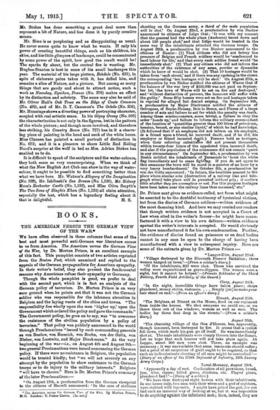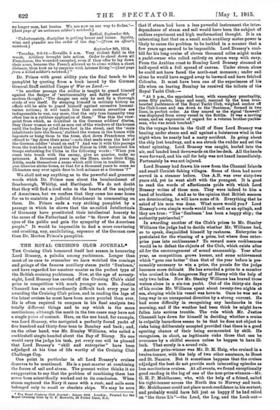BOOKS.
THE AMERICAN VERSUS THE GERMAN VIEW OF THE WAR.*
WE have often observed in these columns that some of the best and most powerful anti-German war literature comes to ns from America. The American versus the German View of the War, by Dr. Morton Prince, is an excellent example of this fact. This pamphlet consists of two articles reprinted from the Boston Port, which examined and replied to the appeals of the German propagandists for. American sympathy. In their writer's belief, they also present the fundamental reasons why Americans referee their sympathy to Germany.
Though the whole pamphlet is good, we prefer to deal with the second part, which is in fact an analysis of the German policy of terrorism. Dr. Morton Prince fe on very sure ground when he points out that it was not the German soldier who was responsible for the inhuman atrocities in Belgium and the laying waste of the cities and towns. "The responsibility Hes wholly upon the men ' higher up,' upon the Government which ordered the policy and gave the commands." The Government policy, he goes on to say, was " to overcome the resistance of the civilian population by E policy of terrorism." That policy was publicly announced to the world through Proclamations "issued by such commanding generals as von Buelow. von Emmich, von Boehn, von der Gaits, von Weber, von Lnetwitz, and Major Dieckmann." At the very beginning of the war--i.e., off August 4th and August 9th— two general Proclamations were issued announcing the German policy. If there were no resistance in Belgium, the population would be treated kindly; but "we will act severely on any attempt by the population to show resistance to the German troops or to do injury to the military interests." Belgians "will have to choose." Here is Dr. Morton Prince's summary of the later Proclamations "On August 17th, a proclamation from the German viewpoint to the citizens of HaeseH =zoomed, •In the case of civilians
• The American wren. the German rime of the Wu, By Harlan Prince, Mil London: 1'. Fisher llsorin. 11s. net.)
shooting on the German army, a Bard el the mate impel:aim wilt be shot.' On August 22nd, a proclamation by von lineloor anxicmnoed to eitizons of Liege that • It was with my consent that the general had the whale place (Andeime) hand down and about 100 people shot,' and that Lilt° would be treated in the same way if the inhabitants attacked the Gorman troops. On, August 25th, a proclamation by von Buelow announced to the citizens of Namur: (/) That citizens who did not betray the presenee of Belgian and French soldiers would be • condemned to hard labour for life and that every nods soldier found would 'he immediately shot.' (2) That any citizen who did not inform the authorities of the existence. of any arms, powder or dynamite which he knew of would be shot. (a) That 10 hostages would be taken from • each street,' and if there was any opriaing in the street the corresponding tan hostages will be aka.' On August 27th, proclamation by von Nicker notified the citizens of Warta that if the balance of the war levy of 8500,000 was not paid on Septem- ber lert, 'the town of Werra will be set on fire and destroyed,' and • without distinction of persons, the innocont will suffer with the guilty.' Some fifty houses were set on fire and hostages lakes in reprisal for alleged but denied sniping. On September Sat,. a proclamation by Major Dieckmann notified the citizen. of Grivegnee, of Beyne-fleuzay, Bois lo Brous, and Fleren of a large number of acts and failure to act for which the penalty woo death. Among these misdemeanours, some trivial, a failure to obey the order • hand. up,' and failure to inform the military eommandant of the location of 'quantities greater than 100 litres of petrolenm, benzine, benot, or any similar of which he had knowledge. (It followed that if an employee did not inform on his employer, or a friend upon a friend, ho incurred death, and it he did, his employer or friend incurred death.) Persons held as hostages, when their relieving substituTas did not present themselves within twenty-four hours of the appointed time, incurred death, and also if the population of the communes did not remain • quiet in any circumstance.? On September 4th, n proclamation by von Hoehn notified the inhabitants of yermonde to • hoist the white flag immediately and to case fight&g. If you do not agree to this summons the town will be razed in as eplarter of an hour by a very heavy bombardment.' On October 5th, a proclamation by Tall der Golfs announced ' In future, the localities nearest to the place where similar note (destruction of a railway line and tele- graph wires) take place will be punished without pity; it matters little whether they are nesonspliess or nett For this pi:epee° hostages base been taken near the railway lines thus menaced,' etc."
Dr. Prince next gives us evidence called, not from what might be asserted to be the doubtful testimony of hysterical victims, but from the diaries of German soldiers—written evidence of the most damning kind. And here we may remind our readers that though written evidence is not accepted in a Court of Law when cited in the writer's favour—he might have manu- factured it with a view to his own defence—written evidence against the writer', interests is accepted. He would obviously not have manufactured it for his own condemnation. Further, the evidence of diaries found on prisoners or on dead bodies cannot in any case be open to the charge of having been manufactured with a view to subsequent inquiry. Here are some of the extracts given by Dr. Morton Prince r-
"Larrgevillier, August 22nd. • Village destroyed by the Eleventh Pioneer Battalion ; three women hanged on gees'—(From a soldier's diary.)
'Of the inhabitants, SOO were shot. Those who survived the volley were requisitioned as grave-digeers. The women were a sight, bet it sonnet be holpes12—(Praoto &Mentor of the Third Battery, Fourth Pield Artillery, of the Guard.)
Cirey, August 24th.
In the night, incredible things have taken place; shops plundered, money stolen, violence. . Simply [sic] to snake your hair stand on end.'—(Prom an officer's diary.) Dinant, August 25th.
'The Belgians, at Dinant on the Meuse, fired on our regiment from inside the houses. We shot everyone we could see, or we threw them out of the windows, women as well as men. The bodies lay three feet deep in the streets.'—(Prom a soldier's diary.)
August MIL
'The charming village of the Gus d11011111119, I1611, apparently, though innocent, been destroyed by fire. It seems that a cyclist fell down, which made his gon go off itself. He wan immediately shot at. The stale inhabitants were simply thrown into the flames. Let us hope that such horrors will not take place again. At Leppes, about 200 men were shot. There, an example was necessary ; it was unavoidable that some innocentn should suffer but a proof of all suspicions of guilt ought to he required, so that such an indiscriminate shooting of all men might be controlled.'— (Diary of an officer of the 178th Regiment of Infantry, 12th Saxony Army Corps) Laval-Moraney, August 28th.
• Apparently a day of rest. Confiscation of all provisions, bread, jam, wine, cigars; killed geese, chickens, etc- Played piano, plundered fast t —(Diary of a soldier.)
'We hare thus destroyed eight bonsai with their inhabitant& In one house only, two men with their wives and a girl of eighteen, were stabbed with bayonets. I might have pitied the girl, for she had such an innocent way of losiking at us, but it isle impossible
to do anything against the infuriated mob; then, indeed, they are
no longer men, but brutes. We are now on our way to Sedan.'— (Last page of an unknown soldier's notebook.) Rethol, September 8th.
'Unfortunately, discipline is getting looser and looser. Spirits, wino and plunder are the order of the day.'—(From an officer's notebook.) September 8th, 1914.
'Tuesday, 8-9-14.—Itavellle 5 a.m. Very violent fight in the woods. Artillery brought into action. Order to shoot down all Frenchman, the wounded excepted, even if they offer to lay down their arms, because the French allowed us to come within a short distance, then took us by surprise with intense firing.'—(Last page from a killed soldier's notebook.)"
Dr. Prince with great ability puts the final touch to his pamphlet by quoting from a book issued by the German General Staff entitled Usages of War on Land:—
" in another passage the soldier is taught to guard himself against the danger of 'sentimentality and flabby emotion' of modern thought; 'The danger can only be met by a thorough study of war itself. By steeping himself in military history an officer will be able to guard himself against excessive humani- tarian notions; it will teach him that certain severities are indispensable to war, nay more, that the only true humanity very often lies in a ruthless application of them.' Wee this the view- point from which, as described in the German soldiers' diaries, they threw women as well as men out of the windows of the houses until the bodies lay piled three feet in the street, cast the ' male inhabitants into the flames,' stabbed the women in the homes with bayonets or hung them to the trees, shot down Frenchmen who offered to 'lay down their arms '—acts that made even the hair of the German soldier stand On end' P And was it with this passage from the text-book in mind that the Kaiser in 1900 instructed his troops embarking for China in the following words : 'When you come into touch with the enemy, give no quarter, make no prisoner.. A thousand years ago the Runs, under their King, Attila, made themselves a name which still lives in tradition. Do you likewise strike home, so that for a thousand years to came no Chinaman may ever again dare to look askance at a German'?"
We shall not say anything as to the powerful and generous words which Dr. Prince saes about the bombardment of Scarborough, Whitby, and Hartlepool. We do not doubt that they will find a loud echo in the hearts of the majority of Americans, but we confess that they come too near home for us to maintain a judicial detachment in commenting on them. Dr. Prince ends a very striking pamphlet by a passage in which be shows that the so-called Intellectual. of Germany have prostituted their intellectual honesty to the cause of the Fatherland in order "to throw dust in the eyes of the public and gain the sympathy of the American people." It would be impossible to find a more convincing and crushing, nay, annihilating, exposure of the German case than Dr. Morton Prince's pamphlet.



































 Previous page
Previous page